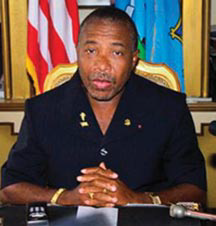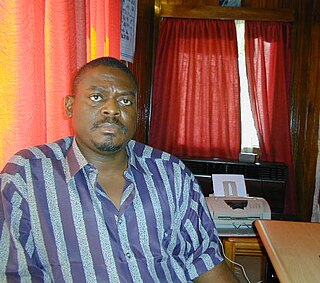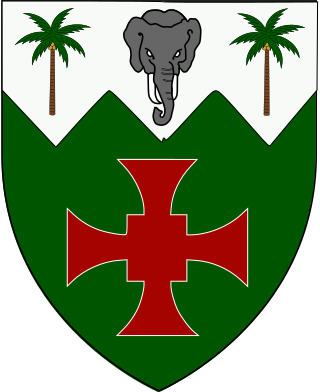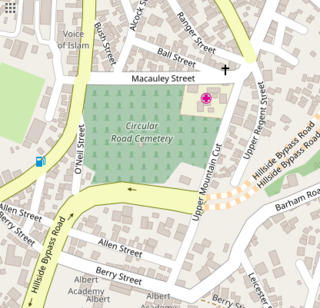Related Research Articles

Sierra Leone, officially the Republic of Sierra Leone, is a country on the southwest coast of West Africa. It shares its southeastern border with Liberia, and the northern half of the nation is surrounded by Guinea. Covering a total area of 71,740 km2 (27,699 sq mi), Sierra Leone has a tropical climate, with diverse environments ranging from savanna to rainforests. The country has a population of 7,092,113 as of the 2015 census. Freetown is the capital and largest city. The country is divided into five administrative regions, which are subdivided into 16 districts.
Sierra Leone first became inhabited by indigenous African peoples at least 2,500 years ago. The Limba were the first tribe known to inhabit Sierra Leone. The dense tropical rainforest partially isolated the region from other West African cultures, and it became a refuge for peoples escaping violence and jihads. Sierra Leone was named by Portuguese explorer Pedro de Sintra, who mapped the region in 1462. The Freetown estuary provided a good natural harbour for ships to shelter and replenish drinking water, and gained more international attention as coastal and trans-Atlantic trade supplanted trans-Saharan trade.

Freetown is the capital and largest city of Sierra Leone. It is a major port city on the Atlantic Ocean and is located in the Western Area of the country. Freetown is Sierra Leone's major urban, economic, financial, cultural, educational and political centre, as it is the seat of the Government of Sierra Leone. The population of Freetown was 1,055,964 at the 2015 census.

Charles McArthur Ghankay Taylor is a Liberian former politician and convicted war criminal who served as the 22nd president of Liberia from 2 August 1997 until his resignation on 11 August 2003 as a result of the Second Liberian Civil War and growing international pressure.

Major Johnny Paul Koroma was a Sierra Leonean military officer who was the head of state of Sierra Leone from May 1997 to February 1998.

Siaka Probyn Stevens was the leader of Sierra Leone from 1967 to 1985, serving as Prime Minister from 1967 to 1971 and as President from 1971 to 1985. Stevens' leadership was often characterized by patrimonial rule and self-indulgence, consolidating power by means of corruption and exploitation.

Brigadier David Lansana was the first prominent Sierra Leonean in the Sierra Leone Military during the colonial era. After Sierra Leone gained independence, he served as Military Attaché to the United States.

The Special Court for Sierra Leone, or the "Special Court" (SCSL), also called the Sierra Leone Tribunal, was a judicial body set up by the government of Sierra Leone and the United Nations to "prosecute persons who bear the greatest responsibility for serious violations of international humanitarian law and Sierra Leonean law" committed in Sierra Leone after 30 November 1996 and during the Sierra Leone Civil War. The court's working language was English. The court listed offices in Freetown, The Hague, and New York City.
Emmanuel Bankole Timothy was a Sierra Leonean journalist. He was also an author and wrote biographies of Albert Margai, prime minister of Sierra Leone (1964–67), and Kwame Nkrumah, president of Ghana (1960–66). Timothy served for many years as editor of the Daily Graphic in Accra.

Ernest Bai Koroma is a Sierra Leonean politician who served as the fourth President of Sierra Leone from 17 September 2007 to 4 April 2018.
Mohamed Yahya Sillah is a Sierra Leonean politician, journalist and human rights activist. He was active in the transition efforts from military to civilian rule in Sierra Leone. As the National Chairman of the National Alliance Democratic Party (NADP), he was an unsuccessful candidate in the 1996 Presidential elections.

Fourah Bay College is a public university in the neighbourhood of Mount Aureol in Freetown, Sierra Leone. Founded on 18 February 1827, it is the first western-style university built in Sub-Saharan Africa and, furthermore, the first university-level institution in Africa. It is a constituent college of the University of Sierra Leone (USL) and was formerly affiliated with Durham University (1876–1967).

Mass media in Sierra Leone began when the first modern printing press in Africa arrived at the start of the 19th century. In the 1860s the country became a journalist hub for Africa with professional travelling to the country from across the continent. At the end of the 19th century the industry went into decline and when radio was introduced in the 1930s this became the primary communication media. Print media is not widely read in Sierra Leone, especially outside Freetown, partially due to the low levels of literacy in the country. In 2008 there were 15 daily newspapers in addition to those published weekly. Among newspaper readership young people are likely to read newspapers weekly and older people daily. The majority of newspapers are privately run and are often critical of the government.
The Kono people are a major Mande-speaking ethnic group in Sierra Leone at 5.2% of the country's total population. Their homeland is the diamond-rich Kono District in eastern Sierra Leone. The Kono are primarily diamond miners and farmers.

Alhaji Samuel Sidique Sam-Sumana is a Sierra Leonean politician who was the Vice President of Sierra Leone from September 17, 2007, to March 17, 2015. Sam-Sumana stood as the vice-presidential candidate of the All People's Congress (APC) in the 2007 presidential election, alongside presidential candidate Ernest Bai Koroma. The APC ticket defeated the Sierra Leone People's Party (SLPP) presidential candidate Solomon Berewa and vice presidential candidate Momodou Koroma. Sam-Sumana took office as vice president on September 17, 2007.
Professor Cyril Patrick Foray was a Sierra Leonean educator, politician, diplomat and historian.
Paul Kamara is a Sierra Leonean journalist, football manager, and cabinet minister.
For Di People is a Sierra Leonean Krio-language newspaper based in Freetown, Sierra Leone. It was founded in 1983 by Paul Kamara, who has served as its editor more or less continually since that date. Kamara and other staff have been threatened and imprisoned numerous times in the newspaper's history, most notably in a high-profile seditious libel case following a suggestion that President Ahmad Tejan Kabbah's 1968 conviction for fraud made him constitutionally ineligible for high office.

Circular Road Cemetery is a cemetery located in Freetown, Sierra Leone. It was opened in 1827. Urban expansion had meant that the old burial ground at the south end of Howe Street had become surrounded by houses and so could not be enlarged. While the old cemetery was still used for the descendants of Nova Scotia and Maroon settlers, this was subsequently turned into a playground.

Sierra Leone remained a British colony throughout World War II. As such, it fought alongside the Allies against the Axis. No large scale battles or military action took place in or around Sierra Leone during the war. However, the colony played a critical role in supporting the Allies throughout the conflict, with Freetown acting as an important convoy station.
References
- ↑ "Harry Yansaneh For Di People". Committee to Protect Journalists. Retrieved 19 February 2013.
- 1 2 3 4 5 6 Abdulai, Emmanuel. "Can Sierra Leone bring justice in fatal beating of editor?". Committee to Protect Journalists. Retrieved 19 February 2013.
- 1 2 Media Foundation for West Africa (16 May 2005). "Newspaper Editor Assaulted; Six Papers Forced Off Newsstands for Three Days". Africa News.
- 1 2 "Sierra Leone; Call for Autopsy After Death of Editor of for Di People". Reporters sans Frontieres. 30 July 2005.
- 1 2 "HARRY YANSANEH – former editor of independent newspaper For di People". Lawyers' Rights Watch Canada. Retrieved 19 February 2013.
- ↑ Sesay, Alusine (August 23, 2012). "APC Mayor Symbol - Two Clergies Stand Out". Concord Times.